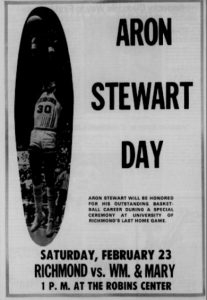In this week’s episode of Expanding the Ivory Tower, Victoria shares some final reflections about her research.
Victoria Charles
The Negligent Imbalance
This week on Expanding the Ivory Tower we think about how black women are left out of the story that the University tells about itself.
A Very Important Letter to the Editor
This week on Expanding the Ivory Tower, we reflect on a letter to the editor of The Collegian published in 1976. The author of the letter, Wanda Starke, and then-president of the Student Organization for Black Awareness (SOBA) wrote in to critique white members of the university community for failing to participate in SOBA’s celebration of Black History Week. This episode considers what happens when people from marginalized groups get to speak to their own experiences.
Unpacking Hillary Tuwei
This week’s episode features the story of Hillary Tuwei, R’80, one of the greatest track and field athletes in University of Richmond history.
Open to Negroes
This week on Expanding the Ivory Tower we consider the narrative of the twelve unnamed black students that integrated night courses at University College back in 1964.
My Chat with Aron Stewart
This week’s episode captures part of a conversation with Aron Stewart R’74 a pioneer black student-athlete with a complex legacy at the University.
The Dreaded Question
This week on Expanding the Ivory Tower Victoria tackles the most asked and the most dreaded question about her research.
With and Against the Grain
This week on Expanding the Ivory Tower Victoria critiques her own research and the practice of working in isolation from the communities she studies.
This Week in the Archive: Aron Stewart Day
 This announcement for Aron Stewart Day, scheduled for February 23, 1974, publicized the celebration of Aron Stewart (R’74) “for his outstanding basketball career during a special ceremony at [the] University of Richmond’s last home game” against William and Mary. Held during halftime, the ceremony lauded his accomplishments on the court before thousands of cheering fans in the newly minted Robins Center. University of Richmond President E. Bruce Heilman, Richmond City mayor Richard Bailey and former UR coach and athletic director Malcolm “Mac” Pitt, took turns praising Stewart’s career. During the ostentatious affair a letter from Governor Mills Godwin was read, Dr. Heilman presented Stewart with a trophy, and the crowd of over 5,000 fans gave him a rousing ovation.
This announcement for Aron Stewart Day, scheduled for February 23, 1974, publicized the celebration of Aron Stewart (R’74) “for his outstanding basketball career during a special ceremony at [the] University of Richmond’s last home game” against William and Mary. Held during halftime, the ceremony lauded his accomplishments on the court before thousands of cheering fans in the newly minted Robins Center. University of Richmond President E. Bruce Heilman, Richmond City mayor Richard Bailey and former UR coach and athletic director Malcolm “Mac” Pitt, took turns praising Stewart’s career. During the ostentatious affair a letter from Governor Mills Godwin was read, Dr. Heilman presented Stewart with a trophy, and the crowd of over 5,000 fans gave him a rousing ovation.
Aron Stewart, the second black student-athlete to sign with the men’s basketball team (after Carlton Mack in 1970), transferred to the University of Richmond from Temple in 1972. The Jersey City, New Jersey native started off his collegiate career at Essex County Community College where he was a junior college All-American and also led the nation in scoring. After becoming eligible to play at the University of Richmond, Stewart rescued the basketball team from ruins. In his first six games alone Stewart helped the team pick up three wins in what had up to that point been a winless stretch. Throughout his two seasons with the Spiders Stewart almost always led the team in scoring and collected various accolades. In the ’72-’73 season he was named the Southern Conference player of the year, finished fourth in the nation with a 30.3 scoring average and broke numerous all-time records at the University. The following season he was named Southern Conference MVP and chosen as a Helms Foundation All-American.
Coverage of Stewart in The Collegian focused on his time on the court and rarely extended to his identity as a black student on campus with the exception of two occasions. In the first, he is discussed in an article about how much black student-athletes have to offer University of Richmond athletics. In the other, he is quoted at the very end of an article about the prestige that he brought to athletics as saying “blacks have no say on this campus.” The near exclusion of Stewart in the discourse surrounding black students at the University is odd because at the time black students were still new to campus and much of their coverage in The Collegian centered on their struggle for inclusion in the mainstream. Both athlete and non-athlete black students were viewed through this lens yet Stewart all but escapes such consideration. It is possible that his status as a campus superstar allowed for those writing to overlook that part of his identity and let his talent transcend his race. In that way, Aron Stewart, the black student-athlete, becomes Aron Stewart, big (raceless) man on campus.
My Chat with Iria Jones
This week’s episode of Expanding the Ivory Tower captures part of a conversation with an alumna whose pathway to the University of Richmond intertwines with the university’s legacy of racial discrimination.
